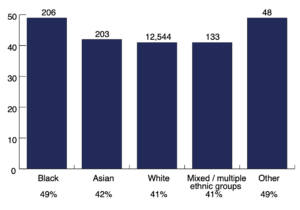CQC publishes data on deaths in care settings broken down by ethnicity
The information that care homes submit to CQC about the deaths of people in their care is published on a weekly basis as part of the Office for National Statistics (ONS) reporting on deaths. The ONS data is not routinely broken down by ethnicity.
The following text is from the Care Quality Commission:
Supported by ONS we have completed a targeted piece of work to analyse the impact of coronavirus (COVID-19) on different ethnic groups in care settings. This data indicates a disproportionate number of deaths among people from BME groups.
While the data we hold has a number of limitations, the lack of data on ethnicity across adult social care as a whole makes it more important that any information in this area is shared – both to aid understanding and highlight the need for more robust data, as well as directing action.
The data published today includes death notifications in adult social care settings from 10 April -15 May 2020 (and the equivalent period in 2019).
While the vast majority of all reported deaths from adult social care settings were White people the proportion of deaths in all adult social care services due to confirmed or suspected COVID-19 was higher for Black (49%) and Asian (42%) people compared to White people (41%) and people from mixed or multiple ethnic groups (41%).
This difference increases when looking at care home settings only, where 54% of deaths amongst Black people and 49% of deaths amongst Asian people are related to COVID-19 compared to 44% of deaths of White people and 41% for mixed or multiple ethnic groups.
Kate Terroni, Chief Inspector of Adult Social Care at the Care Quality Commission (CQC) said: “It is clear that urgent action is needed to fully understand the impact of COVID-19 on people from BME backgrounds in adult social care settings. This data indicates a disproportionate impact on people from BME backgrounds from COVID-19 in adult social care but the limitations of the data mean that much more work is needed.
“More data is critical to understanding the actions that need to be taken across adult social care to ensure that all people are given safe, high quality care, appropriate for their individual needs. Today’s data also highlights the much wider question of how ethnicity is recorded across adult social care.
“We are undertaking a targeted piece of work to review death notifications and how we work with providers to ensure the data provided to us is both accurate and accessible. We will be looking at how we collect data on ethnicity as part of this.”
“But data is only one part of the picture. Everyone involved in adult social care needs to be alert to the increased risk to people from BME backgrounds from COVID-19 in care settings. Every part of the sector needs to work together to look at what is behind the numbers and really examine the care people receive and what can be done to improve this situation.”
Source and Read More: Care Quality Commission









